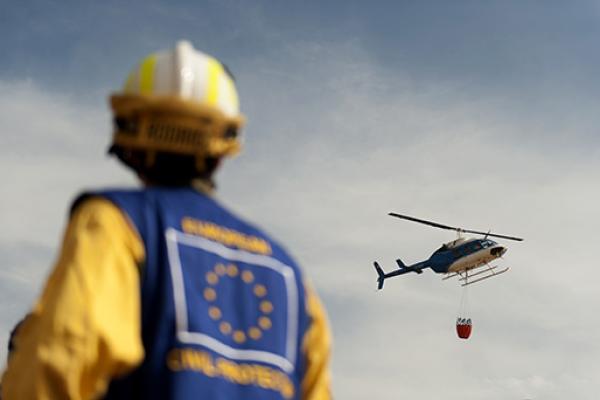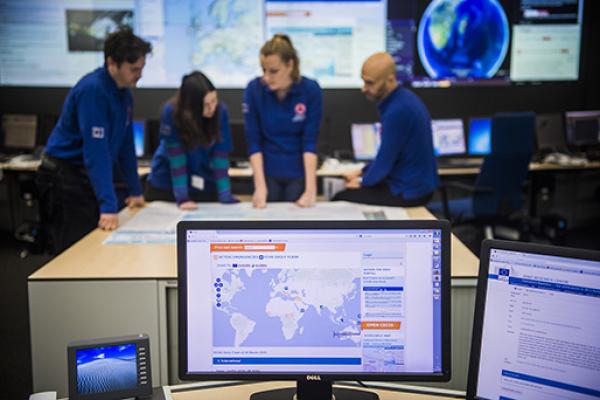
Today, the EU and Moldova sign the Agreement for Moldova to become a Participating State in the EU Civil Protection Mechanism. The Agreement will fully enter into force as of 1 January 2024 after ratification by Moldova, with provisional application of this Agreement starting as from its ratification until entry into force.
This major step of Moldova joining the foundation of the EU's disaster risk management system was marked with a visit by the Commissioner for Crisis Management, Janez Lenarčič, to Chișinău, where he met Minister of Internal Affairs Adrian Efros. They both signed the Agreement to grant Moldova membership status in the EU Civil Protection Mechanism.
Janez Lenarčič, Commissioner for Crisis Management said: “Today, I am proud to welcome Moldova to the family of European rescuers: the EU Civil Protection Mechanism. This step comes five months after I presented Moldova with a pathway document on next steps for joining the EU Civil Protection Mechanism. While Russia’s brutal attack against Ukraine resulted in thousands of Ukrainians fleeing from the war, Moldova proved itself to be a reliable partner, hosting and sheltering many. I want to thank the Moldovan civil protection authorities for their hard work. By Moldova joining the EU Civil Protection Mechanism, we can significantly enhance our emergency preparedness and build a more resilient disaster risk management system in Europe. We are stronger together.”
The EU Civil Protection Mechanism is based on cooperation and solidarity. This allows states to offer assistance to another state when it is struck by a disaster. Moldova has benefitted from the EU Civil Protection Mechanism to cope with a large-scale displacement triggered by Russia's invasion of Ukraine.
Earlier this year, the EU has also deployed 36 power generators to 30 hospitals across Moldova from its rescEU energy reserve. Additionally, the EU has also supported Moldova with €48 million in humanitarian aid since the start of Russia's war of aggression against Ukraine.
As a full member of the EU Civil Protection Mechanism, Moldova will not only be able to receive immediate support, but can also send assistance to countries affected by human-induced disasters or natural hazards through the Mechanism, leading to a stronger and better coordinated crisis response in Europe and in the rest of the world.
Background
The EU Civil Protection Mechanism aims to strengthen cooperation between the EU countries and 10 Participating States (Iceland, Norway, Serbia, North Macedonia, Montenegro, Türkiye, Bosnia and Herzegovina, Albania, Ukraine and most recently Moldova) on civil protection to improve prevention, preparedness, and response to disasters.
When an emergency overwhelms the response capabilities of a country in Europe and beyond, it can request assistance through the Mechanism. The European Commission plays a key role in coordinating the disaster response worldwide.
Since its inception in 2001, the EU Civil Protection Mechanism has responded to 700 requests for assistance inside and outside the EU.
Since the onset of Russia's war of aggression against Ukraine, over 700,000 people have fled to Moldova, and the country currently hosts more than 100,000 Ukrainian refugees.
18 EU Member States and Norway have offered in-kind assistance to Moldova through the EU Civil Protection Mechanism. It includes amongst others, shelter items, medical aid, food and energy supplies.
Given the magnitude of needs, the Commission has also mobilised medical equipment from the rescEU medical stockpiles based in Germany, Hungary and the Netherlands.
In addition, the EU is funding humanitarian projects in Moldova to support vulnerable refugees from Ukraine, local families hosting them, as well as vulnerable Moldovans in need; to this end, the EU has allocated €48 million in humanitarian assistance since the beginning of Russia’s war of aggression against Ukraine.
Details
- Publication date
- 29 September 2023
- Author
- Directorate-General for European Civil Protection and Humanitarian Aid Operations (ECHO)



